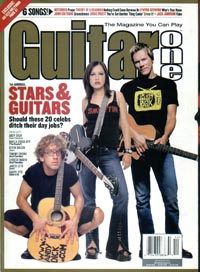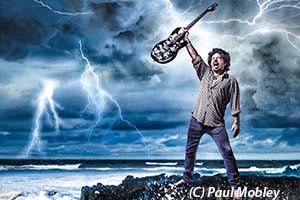How about a full-lenght Steve Lukather Christmas album? (...) Santamental - a disc featuring an A-list of superpickers and some of the most adventurous arrangements of Xmas cuts ever committed to tape. GI recently raided Luke's pad to congratulate him on yet another Grammy win (his fith) and to glean some new licks and concepts. In the process, the star axeman not only demonstrated his obvious appreciation for his mentors, but also shared with us some nuggets he's been fortunate enough to pick up from them directly.
GI: Tell us what it was like winning a surprise Grammy for No substitutions, the instrumental album you recorded with your sensei, Larry Carlton.
Steve: What a trip that was! We put out this little "jam" record (long-winded, real "guitarhead" stuff) thinking: "People should hear it, but it's really for a very specific audience." Never in a million years did I think we'd be nominated. Larry and I were sitting at the Grammys, stumped, going: "Of all the shit we've done that we thought really should've got some attention, this little jam record made some noise."
It was so sweet to be validated like that in 2002 - I'm not just some has-been hack from 1980! It meant a lot to me. Plus, ever since I've been hanging with Carlton, he's just opened up my whole thing: he's been so gracious in sharing his knowledge with me.
GI: Like what?
Steve: All the ii-V turnaround stuff, which I don't for a second consider to have mastered - like playing melodic minor up a half step over the V chord [Ab melodic minor over G7]. There's no point in just playing scales, but it opens up your eyes and ears to a whole other possibility of playing the blues - how you can incorporate that over I-IV-V changes, say in the key of G. There are all these other notes you can use.
We did the record at the Blue Note (Osaka, Japan), and every night I'd sit down in a room with Larry and go: "Okay, what's my lesson for today?" He'd critique my playing and say things like "That was a great set, and you were burning, but here's something to think about..." Then he'd throw out all these other options, like: "In the key of E, you could play around F#, Bm, B, A, Am and D major triads." In other words, stop thinking in E and start thinking of this.
He thinks in terms of three to five different chord substitutions at all times. So if you're just jamming in E, you can turn the whole jam inside out, instead of just playing E minor pentatonic stuff.
Although, if you mix that up with some strange bends, that helps, too.
GI: There are a lot of interesting bends in your more famous leads.
Steve: In the first solo in Rosanna, I bend up to A with my ring finger, then grab a Bb with my pinky. That's a good one, because it's not the obvious bend.
GI: What kinds of things were influencing your lines back then - especially your use of chromatic passing tones?
Steve: It's just jazz stuff. The whole thing about learning how to play jazz is to come to the realization there are really no wrong notes; every note has a place. It's all where you are going that makes you a legitimate player or not. It's the right ii-V turnaround or voice-leading into the next change while staying in the scale that separates the men from the boys.
GI: Were you listening to a lot of jazz players?
Steve: Yeah, I was listening to a lot of that stuff. But what really changes everything for me was Carlton's playing on [Steely Dan's] Royal scam. Hearing that sound - a rock sound playing through changes - struck a nerve with me. He was crancking up his Boogie amp and playing bebop lines with the blues in there, too. That's where all that chromaticism - trying to make an E minor scale sound a little more interesting - comes from.
GI: You studied music at Dick Grove Institute, right?
Steve: I went there during high school with Mike Landau, Steve Porcaro, Carlos Vega and all of our buds. We wanted to "study" music. Imagine the concept these days! Landau and I used to practice together; we'd try to play everything. We thought the "studio guy" thing was really hip; that was the big quest. We'd take every gig you could possibly think of - in any style - just to get our playing and reading chops up. There was so much live work then, because there weren't any machines. And with demo sessions, you could get like $25 a tune - pretty good in 1974. You start getting into that scene, and that's where you learned how to record. Then, when somebody gave you a shot at the big time, you knew how to get your sound and how to find parts real quick. There is no school for that. Of course, the doesn't exist now anyway. It was definitely another era.
GI: What gear are you playing these days?
Steve: My Ernie Ball MusicMan is the only guitar I play. I mean, I got all my vintage stuff, but I play my MusicMan. I have it for ten years now. It's a fantastic instrument; it's so diverse. I used it through a Marschall 1 x 12 on every song on the new Toto album [Through the looking glass]. All the effects were done at the desk. I said: "I'm gonna prove a point. I'm not gonna use anything." You know, "Lukather, and all that rack shit, blah, blah, blah..." I've heard it all.
Now I'm back to using the Bradshaw stuff - the Bradshaw pre-amp, the old classic VHT's, and the same two delay units, the Lexicon PCM 70's, that I've used since 1986. Line 6 gave me a couple of rackmounted things. I also use the Ovation for acouctis stuff, both in the studio and live. I'm getting it more and more simple.
GI: Tell us about Santamental.
Steve: I did my new Christmas record in six days - all analog on a 24-track, no click. Old school. Ninety percent of the solos were live, except for the guests who played on it. Eddie Van Halen played on Joy to the world, which is like Hot for teacher space-boogie tempo. Slash and Mike Landau came by. My son Trevor played guitar with Steve Vai on a track. Edgar Winter came out and did Winter wonderland - living in an Edgar Winter wonderland. I do a Jingle bells duet with Sammy Davis jr. We sampled him and did a whole "big band" thin around him. There's a song on there that I dedicated to Jeff Beck. It's a reharmonized version of Silent night, totally Beck-O style, out of love and respect. I'm honored to be his bud.
There's a guy who should never, ever take a guitar lesson - he IS a guitar lesson! He showed me all his chicken-pickin' shit - all kinds of stuff.
I also did a solo-guitar version of The Christmas song, arranged mostly by Carlton, but I threw some of my own stuff in there. Between Beck, Carlton, Hendrix, and all the bebop guys... I'm just some weird amalgamation of all these cats I grew up listening to.

Guitar One, Guitar school, December 2002




